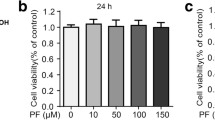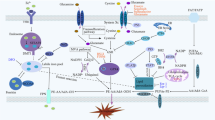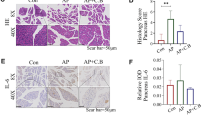Abstract
Ischemia/reperfusion of the small intestine can lead to metabolic and structural alterations in the mucosa. Cellular dysfunction occurs when mitochondrial metabolism is compromised, which may ultimately lead to impaired organ function. The aims of this study were to assess the suppression of cellular and mitochondrial oxidative metabolism and involvement of mitochondria in the ischemia/reperfusion injury. The mitochondria were prepared from isolated enterocytes obtained from the small intestine of anesthetized adult rats following different time periods of ischemia and ischemia followed by 5 min reperfusion. Cellular and mitochondrial function were assessed using MTT (3-(4,5-Dimethylthiazol-2-yl)-2,5-diphenyl tetrazolium bromide) reduction assay. Ischemia of increasing time periods caused a progressive decrease in cellular and mitochondrial MTT reduction in enterocytes and reperfusion showed further decrease of MTT formazan formation. Inclusion of 1 mM succinate, as respiratory subs trate, showed reversal of suppression of mitochondrial function in 30-60 min ischemia whereas 90 min ischemia or short time period ischemia followed by 5 min reperfusion indicated an irreversible damage to mitochondria. This study indicated that mitochondria are a sensitive target of damage due to oxygen deficiency and possibly due to sudden burst of oxygen free radicals. Mitochondria can withstand short periods of ischemia whereas long duration ischemia or reperfusion results in irreversible damage to mitochondrial function. (Mol Cell Biochem 167: 81-87, 1997)
Similar content being viewed by others
References
Granger DN: Role of xanthine oxidase and granulocytes in ischemia-reperfusion injury. Am J Physiol 255: H1269–H1275, 1988
Granger DN, Rutili G, McCord JM: Superoxide radicals in feline intestinal ischemia. Gastroenterology 81: 22–29, 1981
Roy RS, McCord JM: Superoxide and ischemia. In: R. Greenwald and G. Cohen (eds). Conversion of xanthine dehydrogenase to xanthine oxidase. Proceeding 3rd International Conference Superoxide Dismutase. Elsevier/North-Holland, New York, 1983, 145–153
Nalini S, Mathan MM, Balasuramanian KA: Oxygen free radical induced damage during intestinal ischemia/reperfusion in normal and xanthine oxidase deficient rats. Mol Cell Biochem 124: 59–66, 1993
Nilsson UA, Aberg J, Aneman A, Lundgren O: Feline intestinal ischemia and reperfusion: relation between radical formation and tissue damage. Eur Surg Res 25: 20–29, 1993
Nilsson UA, Schoenberg MH, Aneman A, Poch B, Magadum S, Beger HG, Lundgren O: Free radical and pathogenesis during ischemia and reperfusion of the cat small intestine. Gastroenterology 106: 629–636, 1994
Takeyama N, Matsuo N, Tanaka T: Oxidative damage to mitochondria is mediated by the Ca2+-dependent inner membrane permeability transition. Biochem J 294: 719–725, 1993
Malis CD, Bonventre JV: Mechanism of calcium potentiation of oxygen free radical to renal mitochondria-A model for post-ischemia and toxic mitochondrial damage. J Biol Chem 261: 14201–14208, 1986
Richter C, Kass GEN: Oxidative stress in mitochondria: Its relationship to cellular Ca 2+ homeostasis, cell death, proliferation, and differentiation. Chem Biol Interactions 77: 1–23, 1991
Kurup RCK, Kumaroo KK, Dutka AJ: Influence of cerebral ischemia and post-ischemic reperfusion on mitochondrial oxidative phosphorylation. J Bioener Biomemb 22: 61–80, 1985
Andersson BS, Jones DP: Use of digitonin fractionation to deter-mine mitochondrial transmembrane ion distribution in cells during anoxia. Anal Biochem 146: 164–172, 1985
Chance B, Cohen P, Jobsis F, Schoener F: Intracellular oxidation-reduction states in vivo. Science Washington DC 137: 499–508, 1962
Andersson BS, Aw TY, Jones DP: Mitochondrial transmembrane potential and pH gradient during anoxia. Am J Physiol 252: C349–355, 1987
Slater TF, Sawyer B, Strauli U: Studies on succinate tetrazolium reductase systems III. Points of coupling of four different tetrazolium salts. Biochim Biophys Acta 77: 383–393, 1963
Mosmann T: Rapid colorimetric assay for cellular growth and survival: Application to proliferation and cytotoxicity assays. J Immunol Methods 65: 55–63, 1983
Masola B, Evered DF: Preparation of rat enterocyte mitochondria. Biochem J 218: 441–447, 1984
Thambidurai D, Bachhwat BK: Purification and properties of brain alkaline phosphatase. J Neurochem 29: 503–512, 1979
Lowry OH, Rosebrough NJ, Farr AL, Randall RJ: Protein measurement with the Folin-phenol reagent. J Biol Chem 193: 265–275, 1951
Chiu CJ, McArdle AH, Brown R, Scott HJ, Gurd FN: Intestinal mucosal lesions in low flow states. A morphological, hemodynamic and metabolic reappraisal. Arch Surg 101: 478–483, 1986
Parks DA, Granger DN: Contributions of ischemia and reperfusion to mucosal lesion formation. Am J Physiol 250: G749–G753, 1986
Granger DN, Hollwarth ME, Parks DA: Ischemia-reperfusion injury: role of oxygen-derived free radicals. Acta Physiol Scand Suppl 548: 47–63, 1986
Granger DN: Role of xanthine oxidase and granulocytes in ischemia-reperfusion injury. Am J Physiol 255: H1269–H1275, 1988
Berridge MV, Tan AS: Characterization of the cellular reduction of 3-(4,5-dimethylthiazol-2-yl)-2,5 diphenyltetrazolium bromide and involvement of mitochondrial Electron Transport in MTT reduction. Arch Biochem Biophys 303: 474–482, 1993
Loveland BE, Johns TG, Mackay IR, Vaillant F, Wang ZX, Hertzog PJ: Validation of the dye assay for enumeration of cells in proliferative and antiproliferative assays. Biochem Int 27: 501–510, 1992
Henninger DD, Granger DN, Aw TY: Enterocyte respiration rates in feline small intestine exposed to graded ischemia. Am J Physiol 268: G116–G120, 1995
Aw TY, Andersson BS, Kennedy FG, Jones DP: Intracellular O2 supply to support mitochondrial function. In: G. Benzi, L. Packer and N. Siliprandi (eds). Elsevier, Amsterdam, 1986, pp 101–112
Lakshmi B, Mathan MM, Balasubramanian KA: Oxygen free radical-induced damage during colonic ischemia/reperfusion in rats. Mol Cell Biochem 151: 9–14, 1995
Jones DP: Mitochondrial dysfunction during anoxia and acute cell injury. Biochim Biophy Acta 1271: 29–33, 1995
Jones DP, Kennedy FG, Andersson BS, Aw TY, Wilson E: When is a mammalian cell hypoxic? Insights from studies of cells versus mitochondria. Mol Physiol 8: 473–482, 1985
Low MG: Biochemistry of glycosyl-phosphatidylinositol membrane protein anchors. Biochem J 244: 1–13, 1987
Dudeja PK, Brasitus TA: Inactivation of rat small intestinal brush-border membrane alkaline phosphatase by oxygen free radicals. Gastroenterology 105: 357–366, 1993
Sisley AC, Desai T, Harig JM, Gewertz BL: Neutrophil depletion attenuates human intestinal reperfusion injury. J Sur Res 57: 192–196, 1994
Author information
Authors and Affiliations
Rights and permissions
About this article
Cite this article
Madesh, M., Bhaskar, L. & Balasubramanian, K. Enterocyte viability and mitochondrial function after graded intestinal ischemia and reperfusion in rats. Mol Cell Biochem 167, 81–87 (1997). https://doi.org/10.1023/A:1006871622049
Issue Date:
DOI: https://doi.org/10.1023/A:1006871622049




